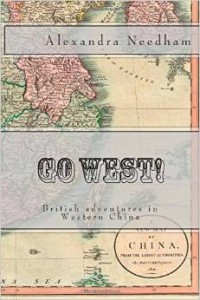Go West!: British adventures in Western China
Posted: August 26th, 2014 | No Comments »Alexandra Needham’s Go West! seems to be a good round up of the British nutters who went West and got themselves into all sorts of trouble….
Between Marco Polo in the late 13th century and French priest Abbe Huc in the 1840s, practically no European set foot in western China – then considered one of the most difficult regions in the world for road, rail and river navigation given its formidable topography of high mountains, deep valleys and great rivers. This isolation gave western China somewhat of a reputation amongst westerners as a hidden El Dorado – a place of great wealth and fertility. From the 1850s onwards, as the Victorian age was in full swing, Britons – and other westerners – began to develop a taste for overseas adventure, exploration and trade as the British Empire expanded its reach across the globe. Britain already had a strong hold in Hong Kong and was present in coastal treaty ports in China, but the Chinese market had not yet produced the massive increase in trade that many colonial expansionists had hoped for. A few adventurous souls began to believe that if access could be gained to the whole of China, through its inland ports, then access could be gained to the world’s largest market with some 400 million people – the size of the whole of Europe. This was not only access for trade purposes. Missionaries believed that the scope of the work they could do in inland China was endless, with a huge population most of whom had never heard of the word of God; and botanists and natural scientists wondered at the myriad exotic and as yet unknown species which flourished in China’s sub-tropical south-western corner. Others were just curious and had an appetite – and the budget to match – for visiting foreign faraway lands and the challenge of the unknown.Politically, opening up inland China was important to the British. Their aim was to develop a trade route from British India and Burma through China to British settlements in China’s coastal cities such as Canton and Hong Kong, as part of the competition between western powers for influence in Asia known as the Great Game. The French in particular were Britain’s adversaries for influence in western China, given the existing French stronghold in Indochina. French hopes were to reach the south-western Chinese province of Yunnan via the Mekong river through Vietnam, Cambodia and Laos. On the basis of these dreams, hundreds of British travellers and explorers set their sights on the Yangtze River – the main access route to the heart and western regions of China – and in particular the region of Chongqing (then known as Chungking) in the western Chinese province of Sichuan – the biggest metropolis of western China. It was – and still is – a gritty inland city, worlds apart from the relatively cosmopolitan cities of China’s eastern seaboard. This book tells the story of their lives in this inland treaty port city, and surrounding region, from the 1870s to just after the Second World War when, for several years, Chungking served as the capital of China. It details the achievements and lasting impact of the British in western China in the fields of diplomacy, trade, culture, science, education and religion. This includes introducing cricket and the first football match to the region; the printing press and the camera; the first steamship to sail through the treacherous Three Gorges – now tamed by the world’s largest dam; and the inspiration for the longest book on China ever to be written in the English language. The idea for this book came during my own time spent living in Chongqing from 2007 – 2010 as Political Consul at the British Consulate-General in the city. Chongqing was not the easiest of diplomatic postings. I started to wonder about the Europeans who came to Chongqing 150 years before me, and the city they must have experienced. This book stands as a record of Chongqing’s European past and the contributions of many foreigners to the city’s development, lest it should all soon disappear amidst China’s rush to develop.

Leave a Reply